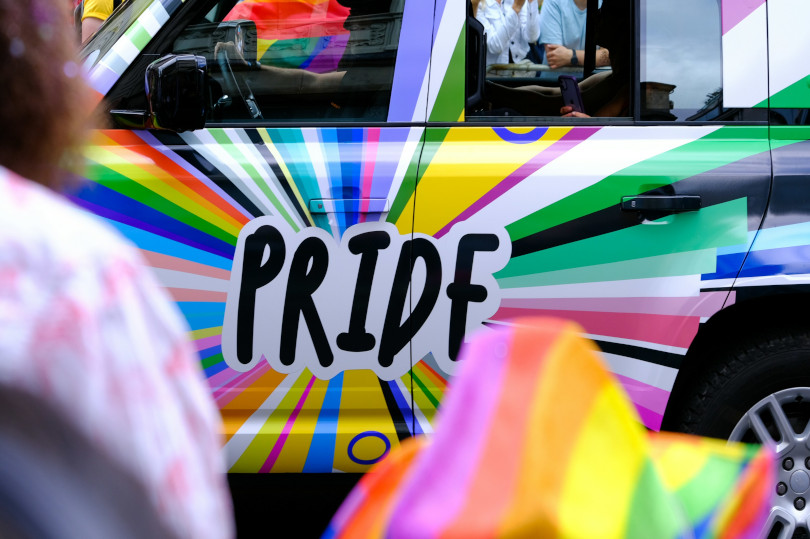This month I attended World Pride in DC with my friends. Growing up in a more conservative town, identifying as bisexual was never something I felt comfortable boasting about. But since starting college in D.C. (which according to the William Institute, has the highest percentage of LGBTQ adults than all 50 states), I haven’t just felt accepted for being queer, but also cool. I’ve been welcomed into a community with such a vibrant and joyful culture that even people outside of it are drawn in.
Notable queer celebrities have helped make queerness feel less like something that sets you apart in a bad way, and more like something to celebrate. Artists like Chappell Roan proudly express their identity through performance — she does drag, and her songs and music videos openly center queer relationships. Renee Rapp has also become a major queer icon, creating music that resonates with LGBTQ+ audiences and speaking openly about her identity in interviews and press tours. She even showed up at World Pride in D.C.
LGBTQ+ pride has become so prominent that even allies want to take part in the culture. In fact, many of my friends who joined me at the parade are straight themselves.
My friend Celia, a fellow gay Jew who attended DC Pride the previous year, states, “There are lots of moments I feel comfortable sharing that I am gay and Jewish. There are also moments that I don’t. I make an effort to be in spaces where my Jewish and gay identities are not just accepted, but valued.” It’s a stance I deeply relate to. Still, it’s not always easy—only about 2.4% of the U.S. population is Jewish, and roughly 5.5% identify as part of the LGBTQ community. I’ve been able to build a circle of friends who either share or embrace both of my identities; however, the reality is that we are still the odd ones out in most settings.
I have noticed that embracing and showcasing one’s culture has become increasingly popular for many identities. Besides the Pride Parade, I’ve attended festivals like the H Street Festival, which celebrates the diversity of culture in DC, performances by student cultural dance groups, and even fashion shows showcasing traditional cultural clothing — all celebrating heritage with pride and excitement. I have also noticed that, through everyday conversations with peers, people are confident discussing their culture in day-to-day conversations without judgment.
When I reflect on my Jewish identity, I feel a striking contrast. Being Jewish does not feel cool. Wearing my chai necklace doesn’t feel like an act of pride; rather, it feels like an act of defiance. It’s something I put on to push back against a narrative rather than something I wear confidently. It’s definitely not something I would ever think to march through the streets celebrating like I do at the Pride Parade. This feeling started when I was growing up in my more conservative hometown. But unlike with my queerness, the embarrassment tied to my Jewishness has followed me to college. It doesn’t really matter where I am, what community I’m in, whether it’s progressive young educated people or more conservative adults from home. This tension around my identity remains present. Just recently, on May 21st, a young Jewish couple was murdered here in DC, leaving both the local and global Jewish communities appalled and afraid. Moments like that remind me that the fear I feel isn’t imagined.
Whenever my Jewish identity comes up in conversation, I feel like people immediately make assumptions that I represent something bigger or more sinister. Which, of course, I don’t. I feel this constant pressure to separate myself from other Jews, as if I need to say, “I’m Jewish, but I don’t support Netanyahu,” or “I’m Jewish, but I’m not like the ones you’re imagining.” Sometimes I find myself explaining away my identity without even realizing it. At first, I didn’t notice I was doing this or at least how damaging these assumptions were. Over time I started to reflect: I would never expect someone who is Russian to answer for Putin or someone Chinese to answer for the Chinese government. So why do I accept it when people make me feel like I have to answer for all Jews?
All I want is the same thing I felt at Pride: to wear my identity on my chest and have that be seen not as a statement or a threat but as a celebration. I want to feel like being Jewish is something I don’t have to defend or soften. I want to feel proud, safe and cool. I think that should be possible.
Just some thoughts I had after attending the parade. I hope others can see this and relate.
Featured image/photo courtesy of iStock: alexis84.


